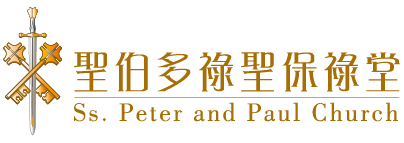
Infant Baptism
1. Obligation of Infant Baptism
“Baptism, the gateway to the sacraments, is necessary for salvation, either by actual reception or at least by desire. By it people are freed from sins, are born again as children of God and, made like to Christ by an indelible character, are incorporated into the Church” (can. 849). As far as infant baptism is concerned, the new Code states the following:
In ordinary circumstances -“Parents are obliged to see that their infants are baptised within the first few weeks” (can. 867, par. 1);
In danger of death – an infant is to be baptised without delay (can. 867, par. 2); the same rule applies to those who habitually lack the use of reason, because they are regarded as infants (can. 99). Infants of non-Catholic parents may be baptised in danger of death even if the parents are opposed to it (can. 868, par. 2), but in this case prudence must be exercised.
2. Infant Baptism – no violation of the child’s freedom
In recent years some people have objected that baptising infants is an obstacle to their freedom. They say it is contrary to the dignity of children as persons to impose on them future religious obligations that they may perhaps later reject. In this view, they insist, it would be better to confer the sacrament only at an age when free commitment has become possible; until then parents and teachers should restrain themselves and avoid exercising any pressure.
Rejecting this view, the Sacred Congregation for the Doctrine of the Faith, in the “Instruction on Infant Baptism” which it issued on 20 October, 1980, pointed out that “there is no such thing as pure human freedom, immune from being influenced in any way. Even on the natural level, parents make choices for their child that are essential for its life and for its orientation towards true values. A so-called neutral attitude on the part of the family with regard to the child’s religious life would in fact be a negative choice that would deprive the child of an essential good” (n. 22).
3. Pastoral Directives
Since the well-being of an infant’s future Christian life is closely related to the parent’s life of faith, the Church will not entrust parents’ with the task of nurturing an infant’s faith if they themselves do not practise the faith.
The above Instruction declares: “Assurances must be given that the gift granted (by baptism) can grow by an authentic education in the faith and Christian life, in order to fulfill the true meaning of the sacrament. As a rule, these assurances are to be given by the parents or close relatives, although various substitutions are possible within the Christian community. But if these assurances are not really serious there can be grounds for delaying the sacrament; and if they are certainly non-existent the sacrament should be refused” (n. 28, 2).
Indications that these assurances are existent are regular attendance at Sunday Mass, devout reception of sacraments, prayers, Scripture readings, acts of charity, etc.
On the other hand, when parents ask to have their child baptised simply for worldly or superstitious motives (e.g., for admittance to a Catholic school, to obtain corporal blessings, or to be saved from misfortune), baptism should be refused or delayed until, through catechetical instruction, they can grasp the real significance of baptism.
Similarly, when Catholics who are married civilly only ask for baptism of their children, the sacrament should also be refused or delayed unless, meanwhile, they make a sincere promise to have their marriage regularized and return to Church life. In any case, whenever baptism has to be deferred or refused, it must be made absolutely clear that this is being done not as a means of exercising pressure on the parents, but simply because, in the circumstances, the probability of the child being educated and brought up as Catholic is absent.
4. Practical Guidelines
Parents rather than other relatives should apply for their infant’s baptism, thus showing their awareness that responsibility for the baptism of their children rests primarily on them;
When selecting god-parents, parents should take into consideration the person’s spiritual maturity and his relationship with the child;
As a rule and unless a just reason suggests otherwise, parents should have the child baptised in their own proper parish (cf. can. 857, par. 2)
Parents and god-parents, whenever possible, should attend the instruction course arranged for them by the parish in order to fully understand the meaning of infant baptism and their responsibility;
Infant baptism should normally be administered after the parents have obtained their child’s birth certificate. This is to avoid possible discrepancies in spelling of names, dates, etc;
since infant baptism is a sacrament which admits one into the Church and is an occasion of joy for the Christian community, it should normally be administered at a communual Baptismal Service. This service should be held, as far as possible, on Sunday, when the Church commemorates the Lord’s resurrection; sometimes infant baptism may be celebrated even during Sunday Mass, but this should not be done too frequently.
Note: Whenever an infant is baptised in danger of death, either in an institution or at home, the person who administered the sacrament must notify the parish priest in whose parish the baptism took place.
